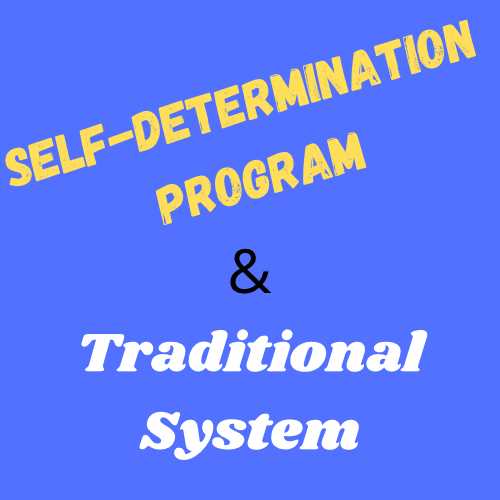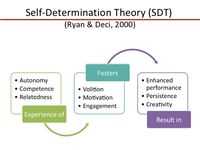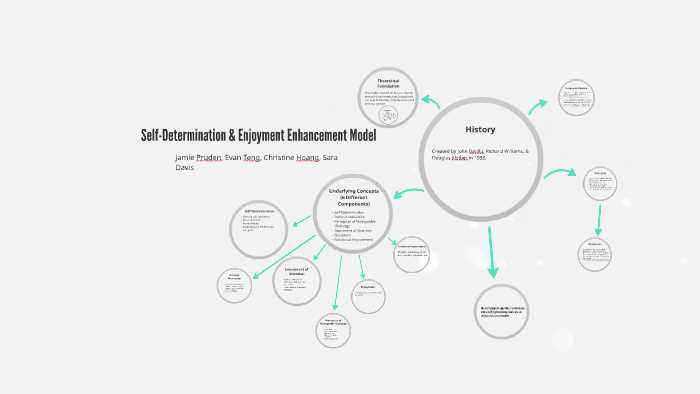Self-determination is the key to achieving your goals and living a fulfilling life. It is the ability to take control of your own actions, make decisions, and stay motivated even in the face of challenges. Developing self-determination can be a lifelong journey, but there are strategies that can help you cultivate this important quality.
First and foremost, it’s important to have a clear vision of what you want to achieve. This involves setting specific goals and understanding why they are important to you. By having a clear vision, you are giving yourself a target to work towards and can stay focused and motivated along the way.
Another strategy is to develop a growth mindset. This is the belief that you can improve and grow through effort and determination. By adopting this mindset, you are more likely to persevere when faced with obstacles and setbacks. You see challenges as opportunities for growth and are more willing to put in the necessary effort to achieve your goals.
In addition, it’s crucial to surround yourself with a supportive network of people who believe in your abilities and can provide encouragement and guidance. Having a strong support system can help you stay motivated and keep your self-determination strong, even when facing challenges.
Furthermore, developing self-discipline is essential for self-determination. This involves building good habits, setting realistic deadlines, and following through on your commitments. By practicing self-discipline, you are able to stay focused and motivated, even when the initial excitement of pursuing your goals wears off.
Lastly, it’s important to celebrate your achievements along the way. Recognize and acknowledge your progress, no matter how small. This not only boosts your self-confidence and motivation, but also reminds you of the importance of self-determination in achieving your goals.
The Importance of Self Determination
Self determination is the ability to make choices and decisions about one’s own life, and to take responsibility for those choices and decisions. It is an important characteristic to develop because it empowers individuals to achieve their goals, overcome challenges, and lead a fulfilling life.
When someone has self determination, they have a strong sense of autonomy and control over their own destiny. They understand that they have the power to shape their future and pursue their dreams. This mindset is crucial for personal growth and success.
Self determination is especially important when it comes to setting and achieving goals. Without self determination, it is easy to get discouraged or give up when faced with obstacles or setbacks. However, individuals who are self-determined are able to persevere and find alternative solutions to reach their objectives.
Another benefit of self determination is increased resilience. When individuals are confident in their ability to navigate challenges and bounce back from failure, they are more likely to take risks and embrace new opportunities. This not only leads to personal growth, but also allows individuals to reach their full potential.
Self determination is also closely linked to overall well-being and happiness. When people feel in control of their lives and have the freedom to make choices that align with their values and desires, they experience a greater sense of fulfillment. This can positively impact mental health and overall life satisfaction.
To develop self determination, it is important to cultivate a growth mindset and believe in one’s own abilities. Setting clear goals, creating action plans, and regularly evaluating progress can also help individuals stay motivated and focused on their objectives.
In conclusion, self determination is a vital characteristic that empowers individuals to achieve their goals, overcome challenges, and lead a fulfilling life. It is important to develop this trait through cultivating a growth mindset, setting clear goals, and taking responsibility for one’s choices and decisions. By doing so, individuals can unlock their full potential and create a life they are proud of.
Setting Clear Goals
Setting clear goals is a crucial step towards developing self-determination and achieving your objectives. A clear goal provides a sense of direction and motivation, helping you stay focused and dedicated to your pursuit.
To effectively set clear goals, follow the following strategies:
- Define your objectives: Begin by clearly defining what you want to achieve. Whether it’s a short-term or long-term goal, make sure it is specific, measurable, achievable, relevant, and time-bound (SMART).
- Break it down: Once your main goal is established, break it down into smaller, manageable tasks. This will make it less overwhelming and more attainable. Create a timeline or action plan to keep track of your progress.
- Visualize success: Use visualization techniques to imagine yourself achieving your goals. Visualizing your success can boost your motivation and belief in your ability to accomplish what you set out to do.
- Write it down: Document your goals in a journal or on a vision board. Seeing your goals in writing will help reinforce them in your mind and serve as a reminder of what you are working towards.
- Stay flexible: While it’s important to set clear goals, it’s also essential to remain open to adjustments and adaptations along the way. Life is unpredictable, and circumstances may change. Be willing to adjust your goals if necessary, while still staying focused on the end result.
Remember, setting clear goals is just the first step. It’s equally important to stay committed, remain persistent, and take consistent action towards your objectives. With a clear direction and determined mindset, you will be well on your way to achieving your goals and living a fulfilling life.
Creating an Action Plan
Once you have set your goals and developed a clear understanding of what you want to achieve, it’s time to create an action plan. An action plan is a roadmap that outlines the specific steps you need to take in order to reach your goals. By breaking down your goals into smaller, actionable tasks, you can stay focused and motivated throughout the process.
Here are some key steps to consider when creating an action plan:
- Define your objectives: Clearly identify the specific outcomes you want to achieve. Make sure they are measurable and realistic.
- Break it down: Divide your goals into smaller, manageable tasks. This will make them less overwhelming and easier to tackle.
- Set deadlines: Establish realistic timelines for each task. This will help you stay on track and hold yourself accountable.
- Prioritize your tasks: Determine which tasks are most important and focus on completing those first. This will ensure you make progress towards your goals.
- Develop a schedule: Create a schedule that outlines when you will work on each task. Make sure to allocate enough time and be consistent with your efforts.
- Monitor your progress: Regularly review your action plan and track your progress. This will help you identify any areas where you may need to make adjustments.
Remember, an action plan is a flexible tool that can be adjusted as needed. It’s important to stay adaptable and make changes as you gain new insights or encounter obstacles along the way.
Developing Discipline and Consistency
Developing discipline and consistency is crucial in achieving your goals and maintaining self-determination. These two qualities go hand in hand and provide a solid foundation for success. Here are five strategies to help you develop discipline and consistency:
- Set Clear Goals: Clearly define what you want to achieve, both in the short term and long term. Setting specific and measurable goals allows you to focus your efforts and maintain consistency.
- Create a Routine: Establishing a daily routine can help you develop discipline and consistency. Set aside dedicated time for working towards your goals and make it a habit to stick to this routine.
- Break Tasks into Manageable Chunks: When working towards your goals, break tasks into smaller, more manageable chunks. This approach helps maintain motivation and prevents overwhelm, making it easier to stay consistent.
- Hold Yourself Accountable: Take responsibility for your actions and hold yourself accountable for the progress you make. Regularly assess your performance, identify areas for improvement, and adjust your plans accordingly.
- Practice Self-Control: Developing self-control is essential for staying disciplined and consistent. Learn to resist short-term temptations that may distract you from your goals and stay focused on the bigger picture.
Remember, developing discipline and consistency takes time and effort. Be patient with yourself and celebrate small victories along the way. With persistent practice and a determined mindset, you can successfully develop these qualities and achieve your goals.
Cultivating a Growth Mindset
A growth mindset is the belief that your abilities and intelligence can be developed and improved through hard work, dedication, and perseverance. Cultivating a growth mindset is essential for self-determination and achieving your goals. Here are some strategies to help you develop a growth mindset:
- Change your perspective: Instead of viewing challenges and failures as setbacks, see them as opportunities for growth and learning. Embrace challenges and adopt a positive outlook, knowing that with effort and determination, you can overcome obstacles and achieve success.
- Set realistic goals: Establish clear and achievable goals that align with your values and aspirations. Break them down into smaller, manageable steps, and celebrate your progress along the way. This will help you stay motivated and build confidence in your abilities.
- Embrace continuous learning: Develop a thirst for knowledge and be open to new ideas and perspectives. Take advantage of opportunities to learn and acquire new skills, whether through formal education, online courses, workshops, or personal experiences.
- Develop resilience: Resilience is the ability to bounce back from setbacks and adversity. Cultivate resilience by reframing negative thoughts, focusing on solutions rather than problems, and developing coping strategies to manage stress and challenges.
- Seek feedback and embrace criticism: Feedback is crucial for growth and improvement. Welcome feedback from trusted mentors, coaches, or peers and use it constructively to enhance your skills and performance. Embrace criticism as an opportunity to learn and adjust your approach.
In conclusion, developing a growth mindset is essential for self-determination and achieving your goals. By changing your perspective, setting realistic goals, embracing continuous learning, developing resilience, and seeking feedback, you can cultivate a growth mindset that will propel you towards success.
Seeking Support and Accountability
One of the most effective strategies to develop self-determination and achieve your goals is seeking support and accountability from others. By involving others in your journey, you can gain valuable insights, motivation, and encouragement to stay on track.
1. Find an accountability partner:
- Look for someone who shares similar goals or has achieved what you are aiming for.
- Set up regular check-ins or meetings to discuss progress, challenges, and celebrate milestones.
- Hold each other accountable for taking necessary actions and staying focused.
2. Join a support group:
- Seek out groups or communities focused on personal development or goal achievement.
- Participate in discussions, share experiences, and learn from others who are on a similar path.
- Receive guidance, feedback, and encouragement from members who understand your journey.
3. Engage in mentorship:
- Find a mentor who has achieved the level of success you desire.
- Learn from their experience, insights, and guidance.
- Regularly communicate with your mentor to receive feedback, advice, and support.
4. Share your goals with loved ones:
- Tell your family and close friends about your aspirations.
- Enlist their support and understanding.
- They can provide emotional support, encouragement, and help you stay committed.
5. Utilize digital tools and apps:
- There are numerous apps and online platforms that offer goal-setting, tracking, and progress sharing features.
- Set up reminders, track your progress, and receive motivation through notifications.
- Share your achievements with an online community or friends to enhance accountability.
By seeking support and accountability, you create an environment that fosters growth, motivation, and determination. Remember, you don’t have to go through your journey alone, and involving others can significantly increase your chances of success.
Overcoming Obstacles and Staying Motivated
While self-determination is crucial in achieving goals, it is not uncommon to face obstacles along the way. These obstacles can be discouraging and may even make you feel like giving up. However, by staying motivated and implementing effective strategies, you can overcome these obstacles and continue working towards your goals.
Here are some strategies to help you overcome obstacles and stay motivated:
- Set realistic goals: When setting goals, it is important to ensure they are realistic and achievable. Setting unrealistic goals can lead to frustration and a lack of motivation. By setting smaller, attainable goals, you can experience a sense of accomplishment and stay motivated throughout the journey.
- Develop a positive mindset: Having a positive mindset is essential when facing obstacles. Instead of viewing obstacles as roadblocks, try to see them as opportunities for growth and learning. By reframing your mindset and focusing on solutions rather than problems, you can overcome obstacles with a more optimistic outlook.
- Seek support: It is important to remember that you do not have to face obstacles alone. Seek support from friends, family, or mentors who can provide guidance, encouragement, and assistance when needed. Surrounding yourself with a supportive network can help you stay motivated and find solutions to overcome obstacles.
- Learn from setbacks: Setbacks are a natural part of the journey towards achieving your goals. Instead of letting setbacks demotivate you, use them as opportunities to learn and grow. Reflect on what went wrong, identify areas for improvement, and adjust your approach accordingly. Learning from setbacks can help you stay motivated and adapt your strategies to overcome future obstacles.
- Celebrate milestones: Recognize and celebrate your achievements along the way. By celebrating milestones, no matter how small, you can boost your motivation and maintain a positive outlook. Take the time to acknowledge your progress and reward yourself for the hard work and effort you have put into achieving your goals.
In conclusion, overcoming obstacles and staying motivated are essential components of self-determination and achieving your goals. By setting realistic goals, maintaining a positive mindset, seeking support, learning from setbacks, and celebrating milestones, you can conquer obstacles and stay motivated on your journey towards success.
Celebrating Achievements and Setting New Goals
Once you have achieved a goal, it is important to take the time to celebrate your achievement. Celebrating your accomplishments provides a sense of validation and can help motivate you to continue working towards your goals. Here are a few strategies for celebrating your achievements and setting new goals:
- Reflect on your accomplishment: Take a moment to reflect on the hard work and effort you put into achieving your goal. Think about the obstacles you overcame and the lessons you learned along the way. This will help you appreciate your achievement even more.
- Share your success: Share your accomplishment with others who have supported you throughout your journey. Celebrate with friends, family, or colleagues who have been there for you. Their encouragement and support can further motivate you to set new goals.
- Reward yourself: Treat yourself to something special as a reward for your hard work and dedication. This could be anything from a small indulgence to a more significant reward, depending on the magnitude of your achievement. Whatever it is, make sure it is something meaningful to you.
- Set new goals: After celebrating your achievement, it’s time to set new goals. Take the opportunity to assess your progress and identify areas for improvement. Set challenging yet realistic goals that will continue to stretch you and help you grow.
- Create an action plan: Once you have set new goals, create an action plan to outline the steps you need to take to achieve them. Break down your goals into smaller, manageable tasks, and set deadlines for each task. This will help you stay focused and motivated on your journey.
Celebrating your achievements and setting new goals is essential for personal growth and development. It allows you to appreciate your progress while also pushing yourself to reach new heights. So take the time to celebrate your achievements and then get ready to conquer your next set of goals!
Questions and answers
What are some effective strategies for developing self-determination?
Some effective strategies for developing self-determination include setting clear goals, developing a positive mindset, practicing self-reflection, seeking support from others, and taking small steps towards achieving your goals.
How can setting clear goals help in developing self-determination?
Setting clear goals helps in developing self-determination by providing a sense of purpose and direction. When you have a clear goal in mind, you are more likely to stay motivated and focused on what needs to be done to achieve that goal.
Why is developing a positive mindset important for self-determination?
Developing a positive mindset is important for self-determination because the way we think about ourselves and our abilities greatly influences our level of motivation and determination. A positive mindset can help us overcome obstacles, stay resilient, and believe in our ability to achieve our goals.
How can self-reflection contribute to developing self-determination?
Self-reflection is a powerful tool for developing self-determination as it allows us to understand our strengths, weaknesses, and areas for improvement. By reflecting on our past experiences and learning from them, we can better understand ourselves and make more informed decisions to achieve our goals.
Why is seeking support from others important for developing self-determination?
Seeking support from others is important for developing self-determination because it provides us with encouragement, guidance, and accountability. When we have a support system in place, we are more likely to stay motivated and committed to achieving our goals, even when faced with challenges.


